

Generative Speaking: The other most powerful transformational behaviour. The Four Agreements. Most ancient cultures have timeless spiritual wisdom from which we can benefit today.

In fact, science and psychology acknowledge the advantages of various age-old practices like meditation, mantra, and yoga, on our overall well being. Many eastern philosophies are incorporated into modern therapies. There are countless ways to connect with a sense of inner peace and divinity, and the ancient Toltec wisdom embodies many of the universally accepted truths adopted by spiritual traditions around the world.
The Toltecs were a civilisation of Mexico thousands of years ago. They were known as spiritual scientists and artists who explored esoteric knowledge and practices. The container for the “U-process dive” is essential – DIAMOND LEADERSHIP. The gendered way we’ve learned to ask questions is terrible for both men and women. “Thank god you picked up,” I whispered to my best friend.

I was huddled in the sticky, single-stall bathroom of an Asian fusion restaurant in Washington, DC, just one closed door away from the dating equivalent of Chernobyl. I had met the guy–Chernobyl–on Tinder. A few minutes later, my friend called with an “emergency” story we concocted in the stall, and I ran for the exit. What Kids Need From Grown-Ups (But Aren't Getting) : NPR Ed.
Annelise Capossela for NPR Erika Christakis' new book, The Importance of Being Little, is an impassioned plea for educators and parents to put down the worksheets and flash cards, ditch the tired craft projects (yes, you, Thanksgiving Handprint Turkey) and exotic vocabulary lessons, and double-down on one, simple word: Play.
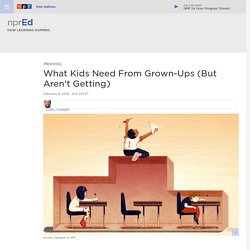
That's because, she writes, "the distinction between early education and official school seems to be disappearing. " If kindergarten is the new first grade, Christakis argues, preschool is quickly becoming the new kindergarten. 7 smarter ways to talk about climate change. People are not very good at talking about climate change, not even climate activists — or so says Norwegian psychologist and economist Per Espen Stoknes.

Understanding the science of climate change isn’t enough. We also need to understand the social science of how people react to certain messages. Stoknes’ book What We Think About (When We Try Not To Think About) Global Warming is a manual for telling better climate-change stories. Celeste Headlee: 10 ways to have a better conversation. The Psychology of Trust in Work and Love. By Maria Popova “When you trust people to help you, they often do,” Amanda Palmer asserted in her beautiful meditation on the art of asking without shame.
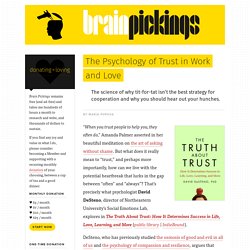
But what does it really mean to “trust,” and perhaps more importantly, how can we live with the potential heartbreak that lurks in the gap between “often” and “always”? That’s precisely what psychologist David DeSteno, director of Northeastern University’s Social Emotions Lab, explores in The Truth About Trust: How It Determines Success in Life, Love, Learning, and More (public library | IndieBound). Julian Treasure: How to speak so that people want to listen. What a difference a word can make. People spend a good deal of time talking to one another, and in general we do it pretty well.
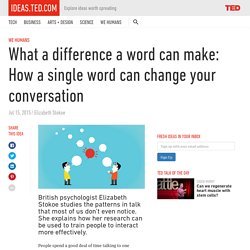
We might feel excited, angry, embarrassed, or — if we’re lucky — loved, in the course of our daily conversations. So is there any benefit to thinking about a science of talk? Can we really gain anything from scientific analysis of something we “just do”? I believe we can, and I’ve spent the last 20 years studying real talk from real people talking to each other in real time. And while the linguist Noam Chomsky once described conversation as a “disorderly phenomenon,” I can tell you that it’s no such thing. Take this ordinary telephone call between two friends, Nancy and Hyla, transcribed according to the standard conversation analysis transcription system, which includes intonation and the actual sounds being made rather than just the correct spelling of a word (lines under a word represent emphasis and different movements in pitch, the equals sign means that the turns are very rapid):
Avoid “Uptalk” to Communicate With More Confidence. The art of meaningful conversation ProSocial. PROSOCIAL is a framework for improving the efficacy of groups that is being developed by the Evolution Institute.

It is based on eight core design principles that are needed by most groups whose members must work together to achieve common goals: Strong group identity and understanding of purpose.Fair distribution of costs and benefits.Fair and inclusive decision-making.Monitoring agreed-upon behaviors.Graduated sanctions for misbehaviors.Fast and fair conflict resolution.Authority to self-govern.Appropriate relations with other groups. These principles were initially derived by Elinor Ostrom, a political scientist by training, for groups that were attempting to manage common-pool resources. The fact that groups possessing these design features were capable of managing their own affairs was so new against the background of received economic wisdom that Ostrom was awarded the Nobel Prize in economics in 2009.
Active listening. Active listening is a communication technique used in counselling, training and conflict resolution, which requires the listener to feed back what they hear to the speaker, by way of re-stating or paraphrasing what they have heard in their own words, to confirm what they have heard and moreover, to confirm the understanding of both parties.
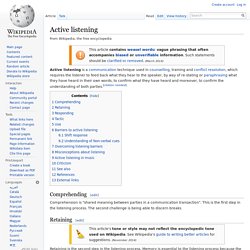
[citation needed] Comprehending[edit] Comprehension is "shared meaning between parties in a communication transaction". The Secret Life of Pronouns: Computational Linguistics and What Our Word Choices Reveal About Us. By Maria Popova.

How to Say What You Really Mean at Work (and Be Heard) The Art of Conversation: Timeless, Timely Do’s and Don’ts from 1866. By Maria Popova.
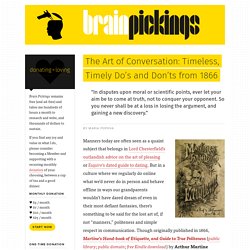
Remember the 7 Cs to Communicate More Effectively.